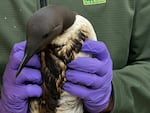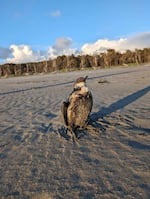
One of four common murres found covered in oil and taken to a rehabilitation center in Oregon between Sunday, May 19, and Tuesday, May 21, 2024.
Courtesy Oregon Department of Fish and Wildlife
At least 10 birds covered with oil have been found along the Northwest coast between Long Beach, Washington, and Lincoln City, Oregon, since Sunday. Three of them died, and some of the surviving birds are in poor condition.
Officials have also received several reports of tar balls along the coast not far from the mouth of the Columbia River.
Ben Anderson, spokesperson for Washington’s Department of Fish and Wildlife, said in an email that small oil spills are not unusual, usually due to sunken vessels or shore-based incidents.
“Spills with an unknown source are less common, but not unprecedented; it’s also early in the investigation and a source may still be identified in this case,” he said.
“The Coast Guard has taken multiple flights to search for the source of the oil, but nothing has been found yet,” Beth Quillian, a spokesperson for the Oregon Department of Fish and Wildlife, said in an email.
Anderson said wildlife officials continue to survey beaches along the coast for wildlife affected by the oil as they search for its source.
“Birds and other wildlife will continue to be recovered as possible and delivered to rehab facilities for rehab and cleaning,” he said.

One of six common murres found covered with oil by the Washington Department of Fish and Wildlife, two of which died. The birds were found between Sunday, May 19, and Tuesday, May 21, 2024.
Courtesy of Washington Department of Fish and Wildlife
All the confirmed oil-coated birds found so far have been common murres — which can travel up to 20 miles offshore when they are not breeding, but stay closer to home during breeding season. Breeding season has not yet started, Anderson said.
“There have been reports of observed oiled birds of other species,” Quillian said. But the person who reported those birds did not know the species, and wildlife officials have not been able to confirm that report.
The U.S. Coast Guard, U.S. Fish and Wildlife Service, National Oceanic and Atmospheric Administration and several Oregon and Washington state agencies are all engaged in the investigation and response.
Officials in both Oregon and Washington are asking people to leave oil-covered birds or other wildlife alone. Instead, anyone who finds injured animals should call 1-800-22-BIRDS. Wildlife officials will try to rehabilitate animals reported to that hotline, although the outlook may be bleak.
“The birds at rehab facilities are in poor condition,” Quillian said. At least one bird taken to a rehab facility in Washington had to be euthanized, she said.
